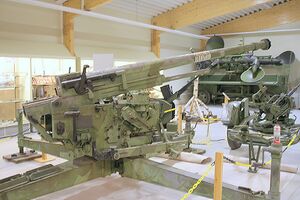Engineering:7.5 cm kanon PL vz. 37
| 7.5 cm kanon PL vz. 37 | |
|---|---|
 | |
| Type | Anti-aircraft gun |
| Place of origin | Czechoslovakia |
| Service history | |
| In service | 1937–1950? |
| Used by | |
| Wars | World War II |
| Production history | |
| Designer | Škoda Works |
| Manufacturer | Škoda Works |
| Produced | 1937–39? |
| Specifications | |
| Mass | 2,800 kilograms (6,200 lb) |
| Barrel length | 3.65 metres (10 ft) L/48.7 |
| Shell | 75 x 656mm R[1] |
| Shell weight | 6.5 kilograms (14 lb) (HE) |
| Calibre | 75 millimetres (3.0 in) |
| Breech | semi-automatic vertical sliding-block |
| Recoil | Hydro-pneumatic |
| Carriage | Cruciform |
| Elevation | 0° to +85° |
| Traverse | 360° |
| Rate of fire | 10–15 rpm |
| Muzzle velocity | 750–775 metres per second (2,460–2,540 ft/s) |
| Effective firing range | 4,000–6,000 m (13,000–20,000 ft) slant range |
| Maximum firing range | 9,200 metres (30,200 ft) vertical ceiling |
| Filling weight | 640 grams (23 oz) |
The 7.5 cm kanon PL vz. 37 (Anti-aircraft Gun Model 37) was a Czech anti-aircraft gun used in the Second World War. Those weapons captured after the German occupation of Czechoslovakia in March 1939 were taken into Wehrmacht service as the 7.5 cm Flak M 37(t) or Flak Skoda. The Germans sold many of them to Italy where they were designated as the Cannone da 75/49 or 75/50. Surviving guns were taken back into German service after Italy's surrender in 1943. Twenty were sold to the Finns in November 1940.[2] Twelve were in Luftwaffe service between April and September 1944.[3]
Description
The gun had a semi-automatic, vertical sliding-block breech that automatically ejected the cartridge case after firing, but had to be hand-loaded for the next shot. It had a standard hydro-pneumatic recoil system and a muzzle brake. It could fire a 6.5 kilograms (14 lb) armor-piercing shell for direct fire. It was intended for motor towing as it rode on a two-axle carriage with pneumatic wheels, but could be towed by horses if necessary. The side legs of the cruciform mount folded for transport.[2]
Notes
- ↑ "75–77 MM CALIBRE CARTRIDGES". http://www.quarryhs.co.uk/ammotable8.html.
- ↑ 2.0 2.1 "ANTIAIRCRAFT GUNS PART 3: Heavy Guns". 23 September 2007. Archived from the original on 16 April 2009. https://web.archive.org/web/20090416175237/http://jaegerplatoon.net/AA_GUNS3.htm. Retrieved 2009-05-22.
- ↑ Gander and Chamberlain, p. 153
References
- Gander, Terry and Chamberlain, Peter. Weapons of the Third Reich: An Encyclopedic Survey of All Small Arms, Artillery and Special Weapons of the German Land Forces 1939–1945. New York: Doubleday, 1979 ISBN:0-385-15090-3
- Kliment, Charles K. and Nakládal, Bretislav. Germany's First Ally: Armed Forces of the Slovak State 1939–1945. Atglen, PA: Schiffer, 1997 ISBN:0-7643-0589-1
External links

